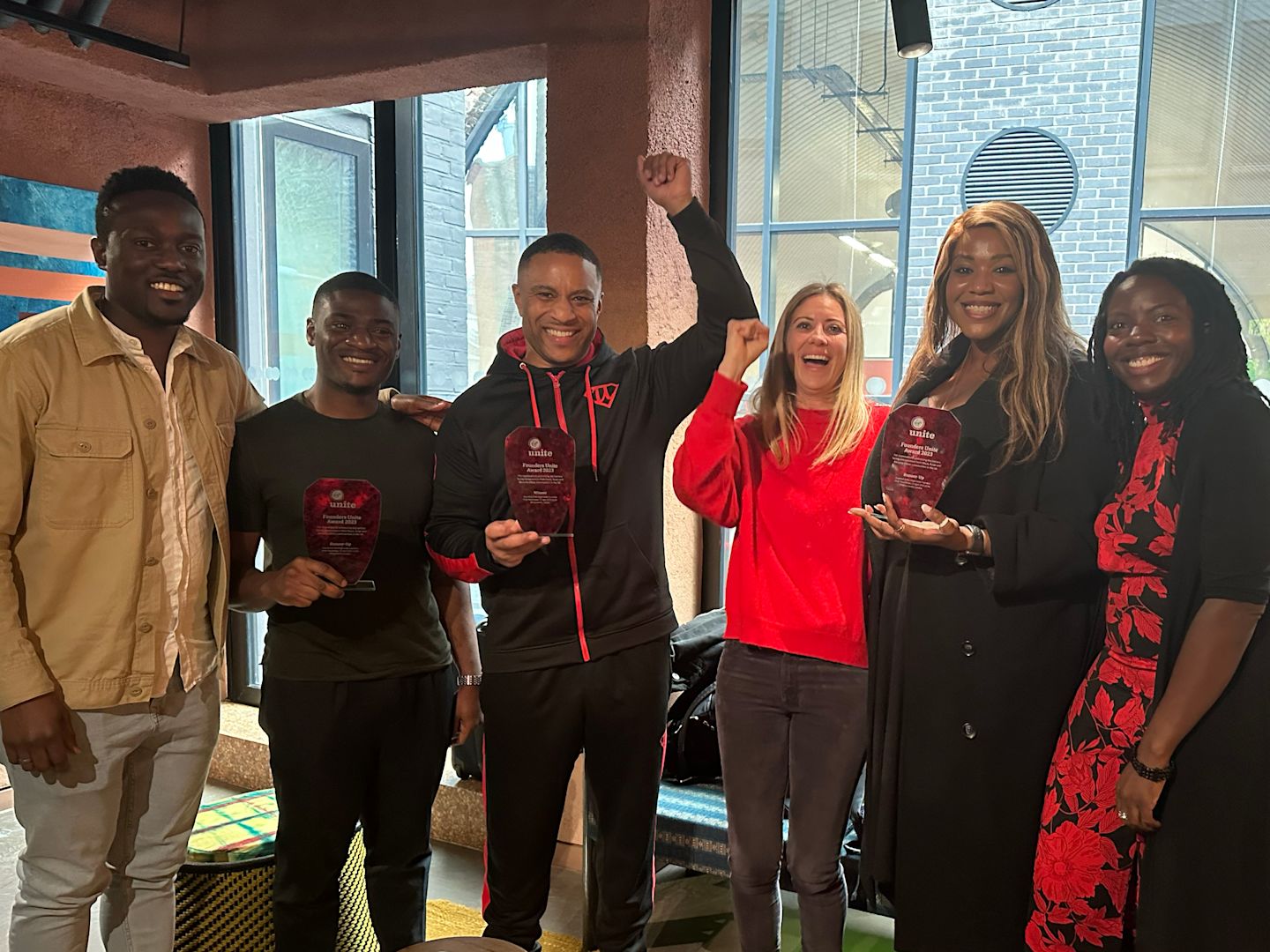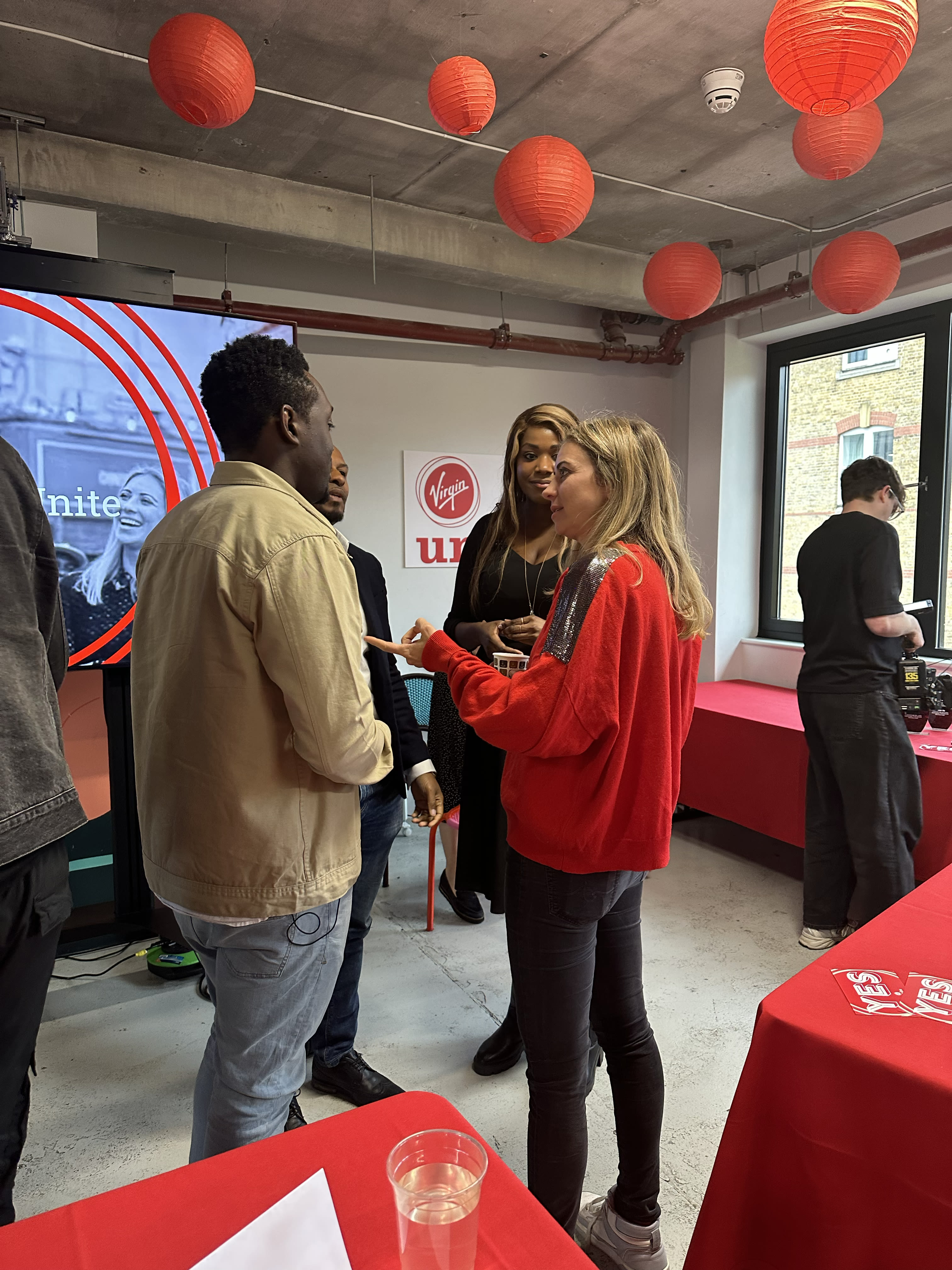Five ways to level the playing field for Black, Asian and minority ethnic entrepreneurs in the UK
“I didn’t want to start a business, I had to.”
These words came from Julian Hall – the founder of Ultra Education, who launched the business when he could no longer accept the systemic barriers and underrepresentation of Black people like himself in the world of entrepreneurship. At a fantastic award ceremony and roundtable last week, Julian also became the winner of Virgin Unite’s Founders Unite award. We launched Founders Unite to highlight the uphill battled faced by Black, Asian and minority ethnic entrepreneurs and to recognise organisations who are challenging these barriers and paving the way for the next generation.
It was so brilliant to meet the three finalists at the ceremony in a room full of passionate investors, entrepreneurs, CEOs, philanthropists, and allies. The finalists (Ultra Education, Foundervine and 1,000 Voices) presented three very compelling pitches to the room after receiving training from Sudha Kheterpal, aka The Pitch Coach. I was so inspired by the different ways that the finalists were levelling the playing field – from Ultra Education’s entrepeneurial programmes for young people; to 1,000 Voices’ impactful storytelling; to Foundervine’s accelerator programmes, dedicated funds, and fellowships. These are three businesses that are addressing inequalities that they also face themselves. As Karl Lokko, the co-founder of Black Seed Ventures and supporter of Founders Unite (and my wonderful friend), said:
I have no appetite to climb the north face of the mountain, but time and time again I’ve had to climb it.
These barriers become even more unacceptable when you realise that less than 1% of venture capital investment in the UK has gone to Black entrepreneurs over the last 10 years. It made me proud to talk about the work Virgin StartUp is doing to close this gap, as 26% of all Virgin StartUp Loans (from the past 10 years) were given to founders from an ethnic minority background. The team is working to equalize this further, 59% of founders on its StepUp programmes (from 2016-2023) coming from ethnic minority backgrounds.
After the Founders Unite finalists shared their pitches, everyone in the room contributed to one of the most authentic, insightful, and articulate conversations about how to level the playing field from many different angles. It was a conversation everybody should hear, so I wanted to share some of the key points here.
Five ways to level the playing field for Black, Asian and minority ethnic entrepreneurs in the UK:
1. People from marginalised communities miss out on financial education and acumen, and this starts at school. When seeking funding, entrepreneurs often give up too much equity because they don’t have enough investment knowledge to negotiate a good deal. This is a bigger barrier for entrepreneurs from disadvantaged communities where the education gap is even wider, and where self-funding is hardly ever option. This knowledge gap needs to be addressed, so people don’t give away too much of their business and make smarter investment decisions.
2. Funding and wealth creation needs to stay within the founder’s communities. This means more representation of minority ethnic people in venture capital firms and investment committees, and better partnerships and initiatives to re-generate the capital back into underserved communities, and not just into the wallets of (typically white) investors.
3. Funding needs to be more agile and targeted. Almost every founder in the room spoke up about the hoops, regulations, bureaucracy, and rigid policies you have to wade through to secure grants and funding. As Karl said: “It’s so difficult that you end up dying on the vine.” The model needs to change, because it creates yet another barrier for people who need the funding the most.
4. There needs to be better partnerships and allyships with smaller-scale funders, so people can break the reliance on big banks and venture capitalists. This means entrepreneurs can maintain more control of their businesses and their capital, and the funding can be more intentional, targeted and impactful.
5. Don’t be afraid to ask, and if you don’t know who to ask, ‘ask for the ask’. All entrepreneurs (but especially underrepresented entrepreneurs) charter so much unknown territory, so they need mentors and allies they can lean upon. However, there are often questions or requests they don’t even know who to turn to, so Linda Grant, Chair of Virgin StartUp, put it perfectly when she said: “If you don’t know who to ask, ask for the ask.” If the person doesn’t know the answer or can’t help with the request, chances are they’ll know someone who can.
All in all, it was such a constructive conversation that we each took actions from, and I hope people reading this do too. Thank you so much to the founders of 1000 Voices, Ultra Education and Foundervine for building such impactful businesses, and thank you to everyone in the room including Nathalie Richards, Piers Linney, Karl Lokko, Linda Grant, Nathaniel Peat and so many others for supporting Founders Unite and underserved entrepreneurs everywhere. Each of the Founders Unite Award finalists will be awarded a grant by Virgin Unite, as well as in-kind support to amplify, scale or deepen the work they do.




